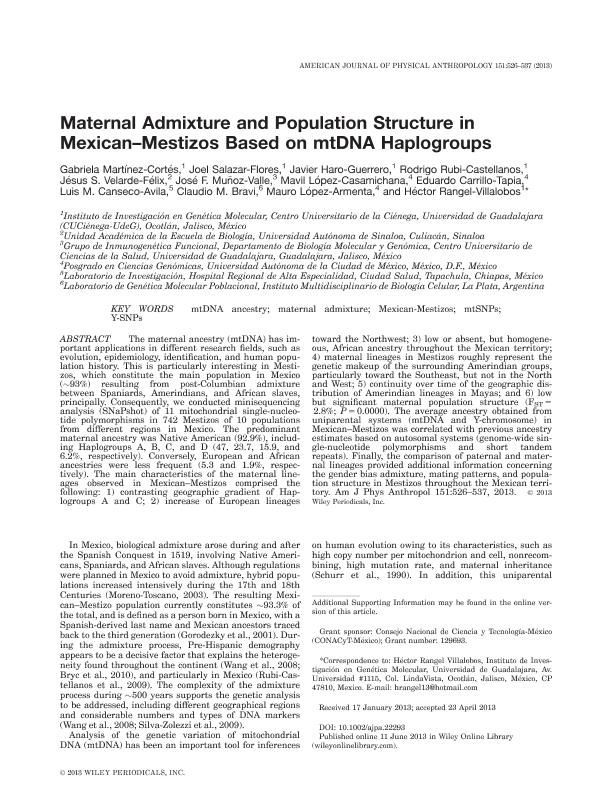Artículo
Maternal admixture and population structure in Mexican-mestizos based on mtDNA haplogroups
Martínez Cortés, Gabriela; Salazar Flores, Joel; Haro Guerrero, Javier; Rubi Castellanos, Rodrigo; Velarde Félix, Jesus S.; Muñoz Valle, Jose F.; López Casamichana, Mavil; Carrillo Tapia, Eduardo; Casenco Avila, Luis M.; Bravi, Claudio Marcelo ; López Armenta, Mauro; Rangel Villalobos, Hector
; López Armenta, Mauro; Rangel Villalobos, Hector
 ; López Armenta, Mauro; Rangel Villalobos, Hector
; López Armenta, Mauro; Rangel Villalobos, Hector
Fecha de publicación:
11/06/2013
Editorial:
Wiley-liss, Div John Wiley & Sons Inc
Revista:
American Journal Of Physical Anthropology
ISSN:
0002-9483
Idioma:
Inglés
Tipo de recurso:
Artículo publicado
Clasificación temática:
Resumen
The maternal ancestry (mtDNA) has important applications in different research fields, such as evolution, epidemiology, identification, and human population history. This is particularly interesting in Mestizos, which constitute the main population in Mexico (∼93%) resulting from post-Columbian admixture between Spaniards, Amerindians, and African slaves, principally. Consequently, we conducted minisequencing analysis (SNaPshot) of 11 mitochondrial single-nucleotide polymorphisms in 742 Mestizos of 10 populations from different regions in Mexico. The predominant maternal ancestry was Native American (92.9%), including Haplogroups A, B, C, and D (47, 23.7, 15.9, and 6.2%, respectively). Conversely, European and African ancestries were less frequent (5.3 and 1.9%, respectively). The main characteristics of the maternal lineages observed in Mexican–Mestizos comprised the following: 1) contrasting geographic gradient of Haplogroups A and C; 2) increase of European lineages toward the Northwest; 3) low or absent, but homogeneous, African ancestry throughout the Mexican territory; 4) maternal lineages in Mestizos roughly represent the genetic makeup of the surrounding Amerindian groups, particularly toward the Southeast, but not in the North and West; 5) continuity over time of the geographic distribution of Amerindian lineages in Mayas; and 6) low but significant maternal population structure (FST = 2.8%; P = 0.0000). The average ancestry obtained from uniparental systems (mtDNA and Y-chromosome) in Mexican–Mestizos was correlated with previous ancestry estimates based on autosomal systems (genome-wide single-nucleotide polymorphisms and short tandem repeats). Finally, the comparison of paternal and maternal lineages provided additional information concerning the gender bias admixture, mating patterns, and population structure in Mestizos throughout the Mexican territory. Am J Phys Anthropol.
Palabras clave:
Mtdna Ancestry
,
Maternal Admixture
,
Mexican-Mestizo
,
Mtsnps
,
Y-Snps
Archivos asociados
Licencia
Identificadores
Colecciones
Articulos(IMBICE)
Articulos de INST.MULTIDISCIPL.DE BIOLOGIA CELULAR (I)
Articulos de INST.MULTIDISCIPL.DE BIOLOGIA CELULAR (I)
Citación
Martínez Cortés, Gabriela; Salazar Flores, Joel; Haro Guerrero, Javier; Rubi Castellanos, Rodrigo; Velarde Félix, Jesus S.; et al.; Maternal admixture and population structure in Mexican-mestizos based on mtDNA haplogroups; Wiley-liss, Div John Wiley & Sons Inc; American Journal Of Physical Anthropology; 151; 4; 11-6-2013; 526-537
Compartir
Altmétricas



